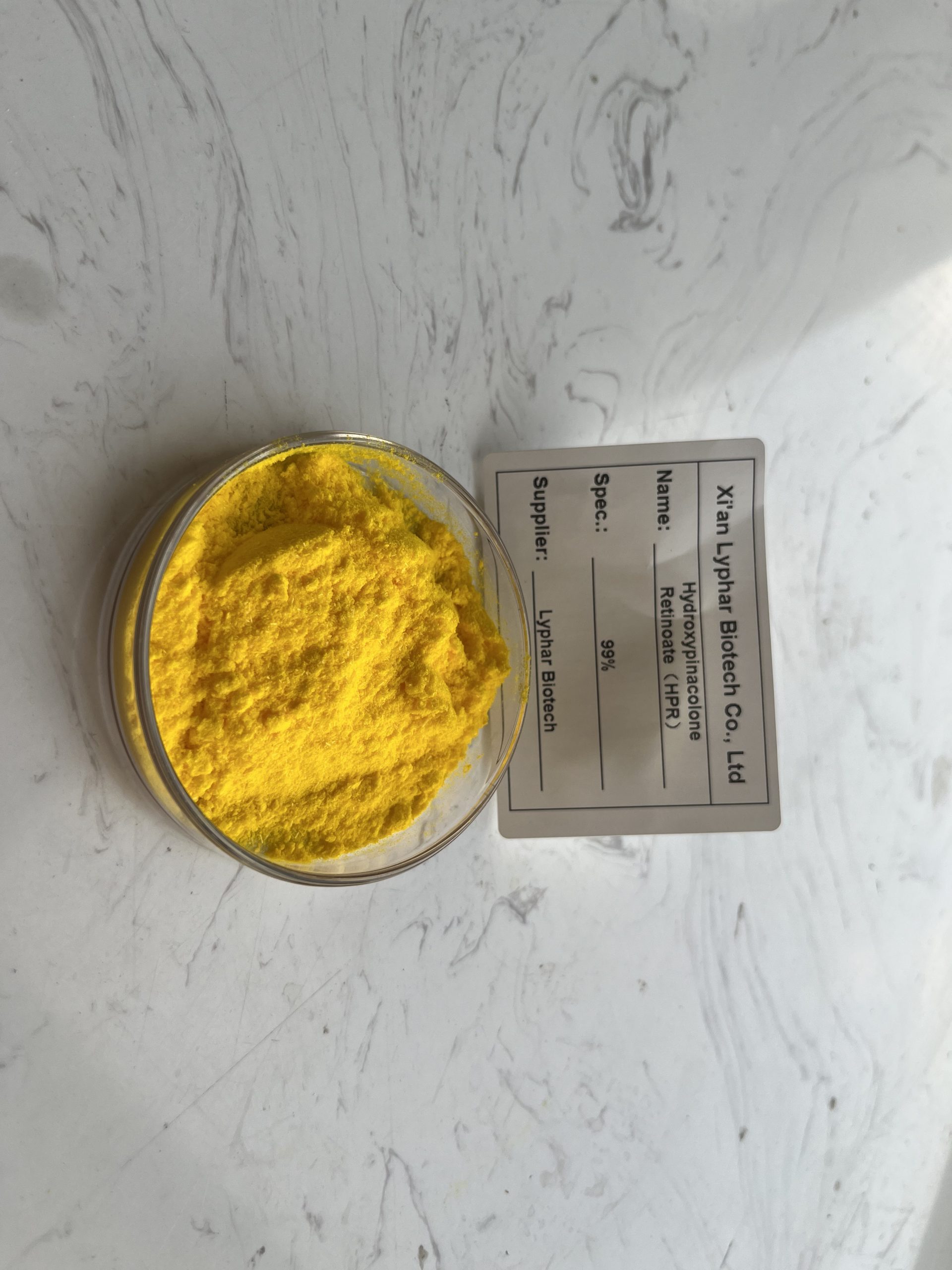Hydroxypinacolone Retinoate (HPR) is a newer derivative of retinoid, a class of compounds related to vitamin A. Here’s an overview of its origin, properties, and introduction:
Origin:
Hydroxypinacolone Retinoate (HPR) was developed as a more stable and less irritating alternative to traditional retinoids. It was first synthesized in the late 1990s by researchers seeking to create a compound with similar effects to retinoic acid (tretinoin) but with fewer side effects.
Properties:
Stability: One of the key advantages of Hydroxypinacolone Retinoate (HPR) is its stability. Unlike traditional retinoids, which are prone to degradation when exposed to light and air, Hydroxypinacolone Retinoate (HPR) remains stable, allowing for longer shelf life and more consistent potency.
Efficiency: Hydroxypinacolone Retinoate (HPR) is believed to have similar, if not superior, efficacy to traditional retinoids in promoting skin cell turnover, stimulating collagen production, and reducing the appearance of fine lines and wrinkles.
Low Irritation: Hydroxypinacolone Retinoate (HPR) is known for being less irritating to the skin compared to other retinoids like tretinoin. This makes it more tolerable for individuals with sensitive skin who may experience redness, peeling, or dryness with traditional retinoid use.

Introduction:
Hydroxypinacolone Retinoate (HPR) has gained popularity in skincare formulations due to its promising benefits and favorable tolerability profile. It’s commonly found in anti-aging products, including serums, creams, and lotions. As consumers seek effective yet gentle solutions for addressing signs of aging, Hydroxypinacolone Retinoate (HPR) has emerged as a key ingredient in many skincare formulations.
Despite its benefits, it’s essential to note that like all retinoids, Hydroxypinacolone Retinoate (HPR) can still cause some degree of skin sensitivity, especially when first introduced to a skincare routine. Therefore, it’s advisable to start with lower concentrations and gradually increase usage to minimize potential irritation.
Always consult with a dermatologist or skincare professional before incorporating new ingredients into your skincare regimen, especially if you have sensitive skin or any pre-existing skin conditions.
Adverse effects of Hydroxypinacolone Retinoate (HPR)
Hydroxypinacolone Retinoate (HPR) is a retinoid derivative that has gained popularity in skincare due to its potential effectiveness and gentleness compared to traditional retinoids like retinol. However, like any skincare ingredient, it can have adverse effects, though they tend to be less severe compared to traditional retinoids. Here are some potential adverse effects of Hydroxypinacolone Retinoate (HPR):
Skin Irritation: Although Hydroxypinacolone Retinoate (HPR) is considered gentler than traditional retinoids, it can still cause skin irritation, especially when used in high concentrations or in combination with other active ingredients.
Dryness and Peeling: Like other retinoids, Hydroxypinacolone Retinoate (HPR) can cause dryness and peeling, particularly when first starting to use it or when using higher concentrations.
Increased Sensitivity to Sun: Retinoids, including Hydroxypinacolone Retinoate (HPR), can make the skin more sensitive to sunlight. It’s crucial to use sunscreen regularly when using products containing Hydroxypinacolone Retinoate (HPR) to reduce the risk of sunburn and other sun-related damage.

Redness and Inflammation: Some users may experience redness and inflammation, especially if they have sensitive skin or are using other potentially irritating skincare products alongside Hydroxypinacolone Retinoate (HPR).
Initial Breakouts: When starting a new retinoid, including Hydroxypinacolone Retinoate (HPR), some people experience an initial breakout period as the skin adjusts to the product. This is often temporary and subsides with continued use.
Photosensitivity: Retinoids, including Hydroxypinacolone Retinoate (HPR), can increase the skin’s sensitivity to light, making it more prone to sunburn and irritation. It’s important to avoid excessive sun exposure and use sunscreen daily while using products containing Hydroxypinacolone Retinoate (HPR).
Potential for Allergic Reactions: While rare, some individuals may experience allergic reactions to Hydroxypinacolone Retinoate (HPR) or other ingredients in skincare products containing it. If you experience any unusual or severe reactions, discontinue use and consult a dermatologist.
It’s essential to start using products containing Hydroxypinacolone Retinoate (HPR) gradually, especially if you have sensitive skin or have never used retinoids before. Patch testing a small area of skin before applying it to your face can help identify any potential adverse reactions. Additionally, consulting with a dermatologist before incorporating Hydroxypinacolone Retinoate (HPR) into your skincare routine can help ensure it’s appropriate for your skin type and concerns.
